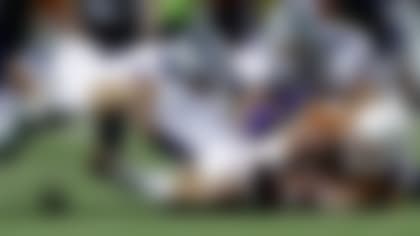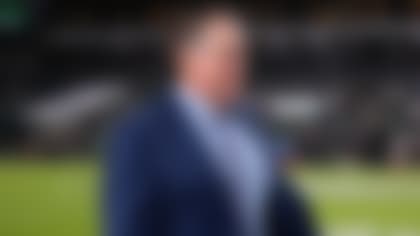The biggest problem with the NCAA's targeting rule -- well, other than the fact it's called differently by basically every officiating crew -- seems likely to go away soon.
The rule, which went into effect last season, states that a player called for targeting will be ejected, and his team will be assessed a 15-yard penalty. The call also was subject to an automatic replay review; if the call was overturned on review, the player was allowed to remain in the game. For some reason, though, the 15-yard penalty still was marched off.
Thankfully, the Football Rules Committee has proposed to also do away with the 15-yard penalty if the play is overturned.
There is an important caveat, as noted on the NCAA's website: "If the targeting foul is committed in conjunction with another personal foul, the 15-yard penalty for that personal foul remains. For example, if a player is called for roughing the passer and targeting the head and neck area, but the instant-replay official rules that targeting did not occur, the player would remain in the game but the roughing-the-passer penalty would still be enforced."
The rules change must be approved by the NCAA Playing Rules Oversight Panel, which meets March 6. Technically, this is an "off year" for the committee to make rules changes, but this is framed as a safety issue, so look for the change to be made.
The committee also recommended a rules change related to defensive substitutions: Basically, an offense can't snap the ball with more than 29 seconds on the play clock. The new rule says a defense must be allowed to substitute within the first 10 seconds of the 40-second play clock, with the exception of the final two minutes of each half. If the ball is snapped with more than 29 seconds on the play clock, a 5-yard delay-of-game penalty will be assessed.
Under current rules, defenses are not guaranteed an opportunity to substitute unless the offense substitutes first. This part of the rule will remain in place in scenarios where the play clock starts at 25 seconds.
The NCAA said its research showed that it's rare for even fast-paced, no-huddle attacks to snap the ball with 30 seconds or more left on the play clock. This, too, is being framed as a safety issue, but this change would be far more controversial.
One reason to run a fast-paced, no-huddle offense is the perception that it can even out roster disparities -- a team with less talent can do something to negate the depth advantage its opponent possesses by not substituting and thus not allowing the defense to substitute. In short, look for pushback on this one from coaches who prefer that style of offense.
Mike Huguenin can be reached at mike.huguenin@nfl.com. You also can follow him on Twitter @MikeHuguenin.












